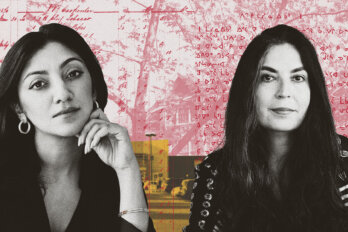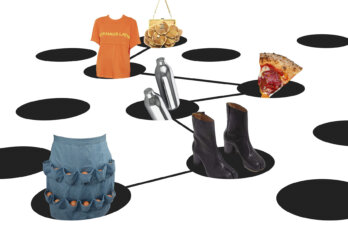A friend recently told me about her daughter’s school project to draw her family tree. The assignment ignited my friend’s interest in genealogy, and what started as homework assistance has become an intricate and rewarding hobby for her. I’m tempted to emulate my friend and spend my free time scrolling through various online databases or digging through archives, looking for who I come from and where my distant relatives are now. But I know, in my case, I’d probably hit a lot of dead ends.
Most of my family’s records, if they exist, would likely be in Syria and other parts of the Middle East, and it’s hard for me to know where to even start looking. I’d have to do my research in Arabic, which isn’t my strongest language. I’m certainly not alone in this predicament. In the age of DNA tests and sites like ancestry.com, amateur genealogy is supposedly more accessible than ever. But it often takes far more work to build a family tree than simply swabbing a cheek or looking up names—especially for those whose families were torn apart by war, colonial conquests, and genocide. In North America, institutional—and often colonial—record keeping obscured the intricacies of Indigenous family relationships. That’s not to mention those whose lives weren’t considered important enough to be documented. Memories are unreliable in many ways; there are those whose family members would rather not speak of the past.
Which might be why I’ve found myself drawn to fictional family trees. Last spring, I read Jasmine Sealy’s debut, 2022’s The Island of Forgetting, which is loosely based on the fabled lineage of Iapetus, a Titan in ancient Greek mythology from whom all humankind was believed to have descended. Each character in Sealy’s novel represses a secret that indelibly shapes the next generation in their saga, which is set mostly in a family-run hotel in Barbados. (In May, The Island of Forgetting won the Amazon Canada First Novel Award, which is administered by The Walrus Foundation.) I then picked up Janika Oza’s A History of Burning (May 2023), which opens in 1898 with a young Gujarati man who is conned into boarding a boat from India to East Africa to help build a railway there during British colonial rule; decades later, his descendants are forced into exile under the regime of dictator Idi Amin. Christine Estima’s The Syrian Ladies Benevolent Society, published in November, opens with a fictional family tree whose roots go back to the Ottoman Empire in 1840.
Each of the titles is remarkable, with characters who grapple with displacement and diasporic living in ways that feel particularly resonant in this moment. By this moment, I mean several things. Like me, the authors are all millennials; our generation is now approaching middle age and all the attendant questions about where we’ve come from and where we’re going. While I’ve read plenty of multigenerational family fiction in the past, the genre has taken on new meaning for me now that I’m a parent, worried about what kind of world my kid will inherit. Each story confronts the theme of intergenerational trauma—a topic that’s received heightened attention in recent years—and how it exerts a force that many of us can barely perceive. And each of these stories was motivated, at least in part, by the missing pieces in the authors’ own family trees.
Sealy tells me she has little knowledge of their ancestors, even those she remembers. She lost both sets of grandparents before she considered asking them questions about their family history, and Sealy’s parents never spoke much about them. She sees the novel not as filling the gaps of their family history but, as she puts it, “dwelling in those gaps.” Sealy’s story is about “family myths and mythmaking and what you don’t know.” (Sealy also reminds me that while the characters’ stories may be inspired by real life, the novel is still a work of fiction—something she says writers of colour, and in particular women, are often forced to reiterate.)
The Island of Forgetting is also a story about the consequences of parents’ decisions—especially the unintended ones. Atlas, a promising scholar, is abandoned as a child and has to live under the shadow of his uncle and, later, his cousin; his daughter Calypso seeks to satisfy a need to live a life outside her parents’ gaze; her son Nautilus struggles with being overlooked. The reader, in following their stories, probably knows more about each character’s origins than they themselves do—and why they are the way they are. This is part of the impetus for the novel, says Sealy; she wanted to explore “how the knowability of yourself . . . relates then to this intergenerational kind of story.”
Oza echoes the sentiment in a letter to the reader that serves as her novel’s preface. “I wrote this book to see where I come from when it’s somewhere I cannot go,” she writes. “I mean this in the concrete way of exile: the place where my ancestors built a life, the community they formed, is one I will never get to experience.” Like the progenitor in her book, Oza’s great-grandfather went to East Africa from Gujarat, India, to work at a railway station; Oza’s parents and grandparents were among those expelled from Uganda decades later.
She never met her grandmother and only knew her grandfather as a young child, she says, and never got to ask them about that history. Even if they were still alive, she’s not sure they would want to share their memories: “It’s a history that holds so much grief.” Instead, Oza interviewed relatives and others who remember the 1970s’ exile of Asian families from Uganda. But she knew many of the questions she had about her family’s history would remain unanswered. “And that’s why fiction I think is so powerful,” she says. “It’s because you’re imagining answers to questions that maybe you don’t have access to.” Writing the book has forced her to “sit with the unknown and to sit with the silences, knowing that some of them will never be filled, and sit with the grief of all of that.”
Estima’s story collection stems from a similar urge to fill the silences in her lineage. Her ancestors long ago immigrated to Canada from what are now Lebanon and Syria, and she’s been writing about her family, in nonfiction and in fictional works inspired by her genealogical research, for years. (Some of the chapters in Syrian Ladies have previously been published as standalone short stories.) In a recent video call, she tells me the book was prompted in part by her discovery, among her late grandmother’s records and photos, of a letter from the real-life Syrian Ladies Benevolent Society, of which her great-grandmother was the president. (Her great-grandfather was the honorary president—maybe, Estima muses, because a man’s presence was required to legitimize the organization.) She thought of the Arab women who have been afforded little space in written history; their lives were so often defined by or in relation to men. Syrian Ladies began, in part, out of a desire to give space to their voices: when there are gaps in your family tree, you start to fashion your own, she tells me.
The first chapter in Syrian Ladies tells the story of Holwé Lutfeya, a woman who grows up in Mount Lebanon in what was then the Ottoman Empire. At twenty, she escapes her village with her infant daughter during a civil war fought between Druze and Christians. She makes her way to Beirut and onto a ship bound, eventually, for Canada. Every subsequent chapter sketches out the lives of Lutfeya’s Arab Canadian descendants, mostly as told by the women in the family, with a frankness that’s refreshing in a culture that expects its women to be reserved, withholding. The last few chapters follow Azurée, a millennial who grows up in Montreal and visits Beirut as an adult, looking for an ancestral connection.
In some ways, her story sets the stage for the future of ancestry. Inherent in all these stories—Estima’s, Oza’s, and Sealy’s—is the impossibility of truly returning to one’s ancestral home. I think about this often: the country I grew up in has been ravaged by war. Even if I were to take my kid there one day, I can’t show her the place I remember because it no longer exists. For her sake as much as mine, I wish I could at least tell her about the people who form her roots there.
I can imagine what to expect, though, given some of the societal norms of the past. I know of forced arranged marriages in my family’s history, and there were likely more before them. I sometimes wonder what those too-young brides would think of my life today. Estima, having come across a twelve-year-old bride in her own ancestry, wrote the girl’s story into Syrian Ladies. In Oza’s and Sealy’s stories, there are family secrets and knowledge that transcend generations. These books offer the sense that while fiction can’t replace real genealogy, it can at the very least put into words hereditary instincts and feelings that even the most rigorous research and sharpest memories can’t always make sense of. The ancestors that exist in our imaginations may not be entirely made up.
But fiction, of course, has its limits. As I write this, I’m thinking of the records of entire families, neighbourhoods, and communities being obliterated, whether by war or other crises, their family trees hacked apart. Novels and short stories cannot restore those bonds, but they might be the only way to process the unfathomable. I wonder how future writers will fill the silences.





